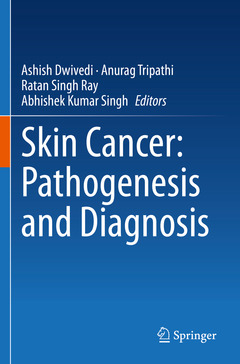Skin Cancer: Pathogenesis and Diagnosis, 1st ed. 2021
Coordonnateurs : Dwivedi Ashish, Tripathi Anurag, Ray Ratan Singh, Singh Abhishek Kumar

Chapter 1. Cancer of the Skin:Type and Etiology.- Chapter 2. Therapeutic intervention in skin cancer: Future prospects.- Chapter 3. Melanin Based Classification of Skin Types and Their Susceptibility to UV-induced Cancer.- Chapter 4. The Epidemiology of Skin Cancer Worldwide.- Chapter 5. UV-R induced Vitamin D synthesis and skin cancer.- Chapter 6. The role of microbiome in the induction, diagnosis and therapy of skin cancer.- Chapter 7. Skin Cancer: Molecular Biomarker for Diagnosis, Prognosis, Prevention and Targeted Therapy.- Chapter 8. Therapeutics intervention of skin cancer in the OMICS era.- Chapter 9. Artificial intelligence in Skin Cancer: Diagnosis and Therapy.- Chapter 10. Biomedical engineering in cancer diagnosis and therapy.- Chapter 11. Skin cancer treatment with Emphasis on Nanotechnology.- Chapter 12. Non-long coding RNA and role in skin cancer diagnosis and therapy.- Chapter 13. Potential of long non-coding RNAs in the diagnosis and therapy of melanoma skin cancer.-
Dr. Ashish Diwedi is a Scientist in the Division of Food, Drug & Chemical Toxicology, CSIR-IITR, a premier Institute of Toxicology Research in India. He has done his post-doctoral research from the Israel Institute of Technology (IIT), Israel and Colorado University, US on cancer therapy. He has also been awarded a prestigious Dr. D.S Kothari Post-Doctoral Fellowship by UGC. He has done his Doctoral Research from Photobiology Division, Indian Institute of Toxicology Research (IITR), Lucknow. His Doctorate research work was focused on phototoxicity/photosafety assessment of therapeutic drugs, environmental pollutants and nanotized phytochemicals at ambient UV-R exposure. He has more than ten years of research experience in Photo & Dermal Toxicology and published several articles in reputed journals of Photochemistry & Photobiology, Toxicology, Biomaterials, and Hazardous materials.
Dr. Anurag Tripathi is working as a Senior Scientist in the Department of Food, Drug and Chemical Toxicology at CSIR-Indian Institute of Toxicology Research. He did his Ph.D. from the School of Biotechnology, Banaras Hindu University. He has 16 years of research experience and published more than 50 research articles in peer-reviewed international journals such as Immunology, Molecular Immunology, Molecular Aspects of Medicine, Toxicology Letters, ACS Nano, Toxicology, and Applied Pharmacology. He is a life member of the Indian Nanoscience Society and serves as an editorial board member in several prestigious international journals such as Journal of Immunology & Serum Biology, SM Journal of Nanotechnology and Nanomedicine, Journal of Toxicology and Forensic cases and Austin Immunology.
Prof. Ratan Singh Ray is a Senior Principal Scientist & Head, Photobiology Division, CSIR-Indian Institute of Toxicology Research, Lucknow. He has twenty-nine years of research experience in the area of Photobiology. He is an active member of v
Presents molecular mechanisms involved in the initiation and progression of skin cancer
Discusses the role of environment and microbiome in skin cancer
Introduces biomarkers for early detection of skin cancer
Reviews role of artificial intelligence and biomedical engineering in diagnosis and therapeutics of skin cancer
Date de parution : 08-2022
Ouvrage de 250 p.
15.5x23.5 cm
Disponible chez l'éditeur (délai d'approvisionnement : 15 jours).
Prix indicatif 179,34 €
Ajouter au panierDate de parution : 08-2021
Ouvrage de 250 p.
15.5x23.5 cm
Disponible chez l'éditeur (délai d'approvisionnement : 15 jours).
Prix indicatif 179,34 €
Ajouter au panierThèmes de Skin Cancer: Pathogenesis and Diagnosis :
Mots-clés :
Skin cancer; Biomarker; Biomedical engineering; Nanotechnology; Non coding RNA



